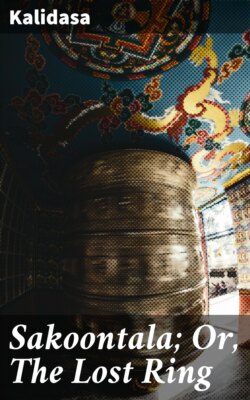Читать книгу Sakoontala; Or, The Lost Ring - Kalidasa - Страница 4
На сайте Литреса книга снята с продажи.
'SIVEN COIL STREET, TRIVANDRUM,
Оглавление'May 1, 1893.
'The members of the "Karamanai Young Men's Mutual Improvement Society" acted your translation of "[S']akoontalá" on the 3rd and 5th of September last year, in the Government Museum Theatre, Trivandrum.
'It was acted in two parts. On the first day Acts I to IV were acted, and on the second the remaining three Acts.
'All our chief native officials and many Europeans and their ladies honoured the occasion with their presence. We acted it a second time at the special request of H.H. the Second Prince of Travancore, in the Palace of His Highness' mother, the Junior Ránee.
'The public were kind enough to pronounce it a success. In many cases the applause given was not so much for the acting as for the beauty of your translation. The Hindús have a great liking for this play, and not one of the enlightened Hindú community will fail to acknowledge your translation to be a very perfect one. Our object in acting Hindú plays is to bring home to the Hindús the good lessons that our ancient authors are able to teach us. If there is one lesson in these days more than another which familiarity with the fountains of Western literature constantly forces upon the mind, it is that our age is turning its back on time-honoured creeds and dogmas. We are hurrying forward to a chaos in which all our existing beliefs, nay even the fundamental axioms of morality, may in the end be submerged; and as the general tenor of Indian thought among the educated community is to reject everything that is old, and equally blindly to absorb everything new, it becomes more and more an urgent question whether any great intellectual or moral revolution, which has no foundations in the past, can produce lasting benefits to the people.
'"I desire no future that will break the ties of the past" is what George Eliot has said, and so it is highly necessary that the Hindús should know something of their former greatness.
'The songs in [S']akoontalá, one in the Prologue and another in the beginning of the fifth Act, very easily adapted themselves to Hindú tunes.'
Towards the end of his letter Mr. Aiyar intimated that he himself took the part of Má[T.]Havya. He also mentioned that a few modifications and additions were introduced into some of the scenes.
In a subsequent letter received from Mr. Keshava Aiyar, the Secretary of the Society, I was informed that my version of the Play was acted again at Trivandrum in 1894.
These descriptions of the successful representation of the [S']akoontalá in Travancore justified me in expressing a hope that, as Kálidása has been called the Shakespeare of India, so the most renowned of his three dramatic works might, with a few manifestly necessary modifications, be some day represented, with equal success, before English-speaking audiences in other parts of the world and especially here in England. This hope has been realized, and quite recently my translation has been successfully acted by amateur actors before a London audience.
I venture, therefore, to add the expression of a further hope that with the daily growth of interest in Oriental literature, and now that the [S']akoontalá forms one of Sir John Lubbock's literary series, it may be more extensively read by the Rulers of India in all parts of the Empire. Those who study it attentively cannot fail to become better acquainted with the customs and habits of thought, past and present, of the people committed to their sway.
And it cannot be too often repeated that our duty towards our great Dependency requires us to do something more than merely rule justly. We may impart high education, we may make good laws, we may administer impartial justice, we may make roads, lay down railroads and telegraphs, stimulate trade, accomplish amazing engineering feats—like that lately achieved at Periyar—increase the wealth and develop the resources of our vast Eastern territories; but unless we seek to understand the inhabitants, unless we think it worth while to study their ancient literatures, their religious ideas, and time-honoured institutions, unless we find in them something to admire and respect, we can never expect any reciprocity of esteem and respect on their part—we can never look forward to a time when the present partition-wall, which obstructs the free Interchange of social relations between European and Asiatic races, will be entirely removed.
MONIER MONIER-WILLIAMS, December, 1898.
